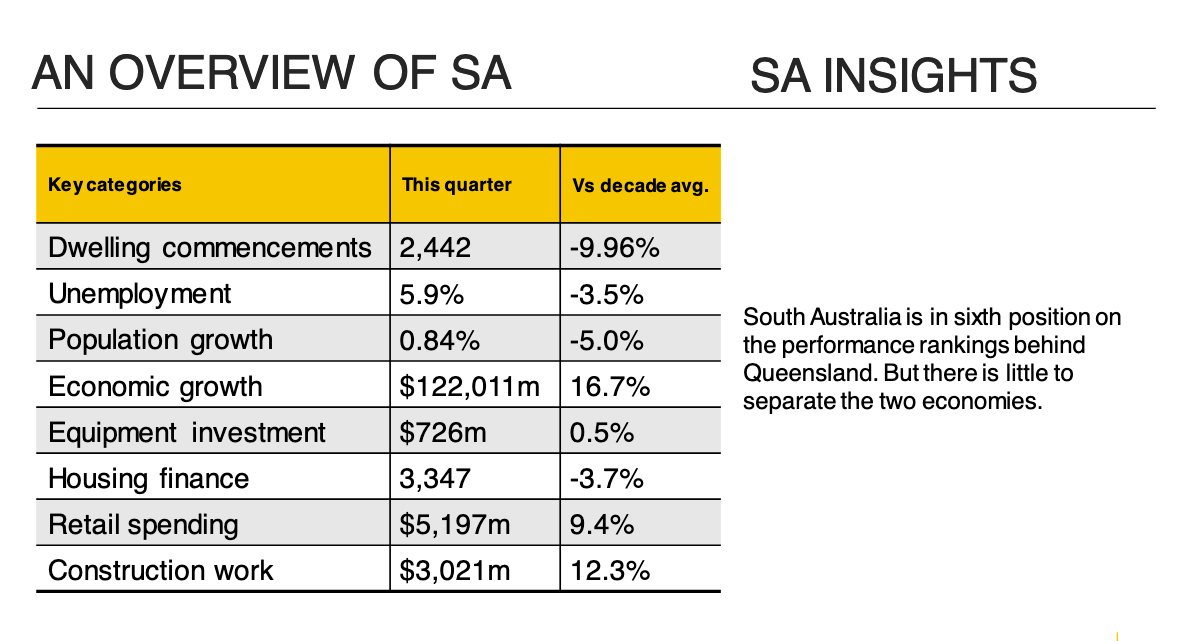SA’s economic ranking drops, but it’s been lower: survey
South Australia has dropped from fifth to sixth position in the Commonwealth Bank’s national economic survey – but remains ahead of the near-bottom ranking it held four years ago.


Photo: Nat Rogers/InDaily
CommSec’s State of the State July quarterly survey ranked SA behind Queensland and significantly behind Victoria, New South Wales and Tasmania, but ahead of Western Australian and the Northern Territory.
The state’s economic performance has continued to slide since it dropped from fourth spot to fifth in October 2017 under the previous Labor State Government.
SA trod water in the fifth spot for the next 21 months, until the latest survey which saw it fall one position.
But it remains ahead of the seventh spot it held in 2015 through to July 2016 before climbing to fourth.
The CommSec report assesses all states and territories across eight key indicators: economic growth, retail spending, equipment investment, unemployment, construction work, population growth, housing finance and dwelling commencements.

The latest survey shows Victoria led the nation of four out of eight economic indicators, including economic growth, retail trade, construction and the jobs market, edging out New South Wales which remained “consistently strong across all indicators”.
While SA had now slipped behind Queensland to take that state’s previous sixth position, the report said there was little to separate the two states’ economies.
The report also highlights the economic resurgence of Tasmania, long considered an economic backwater compared with most mainland states and which was ranked the nation’s lowest at number eight only three years ago.
Tasmania is now rated as Australia’s third best-performing economy overall, ranking first on relative population growth, housing finance and business investment and boasting the nation’s highest number of dwelling starts.
The report also said that while SA’s annual population growth rate is minus five per cent, Victoria’s grew by 2.18 per cent and Tasmania recorded its fastest growth rate for 27 years with 1.24 per cent.
The Northern Territory, by contrast, lost 0.41 per cent of its people in the past year – the biggest decline in 36 years of quarterly records.
Construction activity in South Australia fell by 2.5 per cent from a year ago, while dwelling starts fell by 25.4 to a five-year low.
By comparison, Tasmania’s dwelling starts leapt by 8.1 per cent to an 8-year high.
SA also ranked third on new vehicle sales, but sixth on equipment spending and lagged back with Queensland on retail spending.
Treasurer Rob Lucas said SA traditionally oscillated between fifth and sixth position on the quarterly survey, and despite some bright spots it was a “challenge” to increase the state’s overall performance.
While defence projects such as subs and ship-building, along with the growing space industry, were projects with investment and jobs coming onstream for years to come, one key policy was to stem SA’s population loss and attract new residents.
“Queensland, New South Wales and Victoria are saying they want a smaller share of the national migration intake; we want a bigger share,” he said.
Tasmania had managed to turn its fortunes around to third spot within a few years, and “there’s no reason we can’t have the ambition to aim for that particular part of the ladder”.
Labor Treasury spokesman Stephen Mullighan said SA’s ranking slip followed 16 months of Marshall Liberal Government and cuts to job creation programs, tax increases and a slowdown in infrastructure projects.
“Steven Marshall promised lower costs instead he’s delivering higher costs, and more taxes,” he said.
“This report shows the Liberal Government’s economic strategy of cutting services, privatising assets, increasing taxes and slowing down infrastructure spending is hurting our economy.”
Want to comment?
Send us an email, making it clear which story you’re commenting on and including your full name (required for publication) and phone number (only for verification purposes). Please put “Reader views” in the subject.
We’ll publish the best comments in a regular “Reader Views” post. Your comments can be brief, or we can accept up to 350 words, or thereabouts.
InDaily has changed the way we receive comments. Go here for an explanation.




